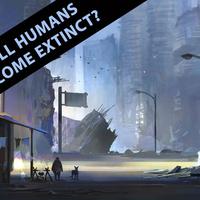Will humans become extinct? 6 Minute English - YouTube
Hello. This is 6 Minute English from BBC Learning
English. I'm Neil.
And I'm Sam.
In this programme, we'll be looking
at some of the many dangers facing
humanity, from climate change and global
pandemics to asteroid impacts and
nuclear war. We'll be finding out whether
human civilisation can survive these risks
and looking at some of the related
vocabulary as well.
Do you really think humans could become
extinct and end up as dead as the dodo?
Ah, so of course you've heard of the dodo?
Yes, dodos were large, metre-high birds which
died out in the 1600s after being hunted
to extinction by humans.
That's right. Dodos couldn't fly and weren't
very clever. They didn't hide when sailors
with hunting dogs landed on their island.
The species was hunted so much that
within a century, every single bird had
died out.
But do you know which island the dodo
was from, Sam? That's my quiz question
for today. Was it:
a) The Galapagos, b) Mauritius or c) Fiji?
I'll guess the Galapagos, Neil, because
I know many exotic animals live there. By
the way, that's also cheered me up a bit
because as humans we are much smarter
than the dodo! We're far too clever to die
out, aren't we?
I'm not sure I agree, Sam. Lots of the
existential risks - the worst possible
things that could happen to humanity,
such as nuclear war, global
pandemics or rogue artificial intelligence,
are human-made. These threats could
have catastrophic consequences for
human survival in the 21st century.
That's true. But existential risks don't
only threaten the survival of the human
species. Instead, they could destroy civilisation
as we know it, leaving pockets of
survivors to struggle on in a post-apocalyptic world.
And it wouldn't be the first time that has
happened, as the BBC World Service
programme The Inquiry found out.
Simon Beard of the Centre for the Study
of Existential Risk at Cambridge
University explains:
The historical record suggests that about
once every thousand years an event
occurs that wipes out about a third of the
human population – so in the Middle
Ages, this was the Black Death - huge
plague that covered Eurasia, while there
was also dramatic global cooling at that
time which many people think
was related to volcanic eruptions and
about a third of the global population died.
So, humanity has been facing these risks
throughout history, according to the
historical record – the collection of all
written and recorded past events
concerning the human race.
Yes. Wars and plagues – infectious,
epidemic diseases which spread between
countries can quickly wipe out – or
completely destroy, millions of people.
And there's not much we can do to stop
disasters like that!
True, Sam, but what about individuals
who actively work to bring about the end
of the world - like apocalyptic terrorists,
rampage shooters and fundamentalist
cults like those who organised the
poisonous gas attack on the Tokyo subway.
Those are people who want to end human
life on Earth and bring about Doomsday -
another word for the final, apocalyptic day
of the world's existence.
Right. And things got even scarier in
modern times with the invention of
nuclear weapons. During the Cuban
Missile Crisis between America
and the USSR for example, risk experts
estimated a 41% probability that human
life would be completely wiped out!
Seth Baum of New York's Global
Catastrophic Risk Institute explains
how human error almost brought about Doomsday:
There are some ways that you could get
to a nuclear war without really intending to,
and probably the biggest example is if you
have a false alarm that is mistaken as a
nuclear attack, and there have been a
number of, maybe even very serious false
alarms, over the years, in which one side
or the other genuinely believed
that they were under nuclear attack, when
in fact they were not at all under nuclear
attack.
One such false alarm - an incorrect
warning given so that people wrongly
believe something dangerous is about to
happen, came about in
1995, when the US sent missiles up into
the Earth's atmosphere to study the
Aurora Borealis, the Northern Lights.
Soviet radars picked up the missiles, thinking
they were nuclear warheads and almost
retaliated. Nuclear Armageddon was only
averted by the actions of one clear-thinking
Russian general who decided not to push
the red button.
Phew! A close shave then! Well, Neil, all
this doomongering has made me want to
just give it all up and live on a desert island!
Like the dodo eh, Sam? So, which island
would that be? If you remember, today's
quiz question asked where the dodo was
from.
I said The Galapagos.
And I'm afraid to say it was b) Mauritius.
So, to recap, in this programme we've
been discussing Doomsday – the final
day of life on Earth and other existential
threats - dangers threatening the survival
of humans on the planet.
We looked back throughout the historical
record - all recorded human history, to see
examples of threats which have wiped
out, or killed millions of people in the past,
including wars and plagues which spread
epidemic diseases between populations.
And we've seen how modern dangers, like
nuclear war and climate change, further
reduce the probability of human survival.
But Sam, it's not all doom and gloom! The
same scientific intelligence which spilt
the atom could also find solutions to our
human-made problems in the 21st century,
don't you think?
So, the end of the world might be a false
alarm – or unfounded warning – after all!
Let's hope we'll all still be here next
time for another edition of 6 Minute English.
Bye for now!
Bye.

